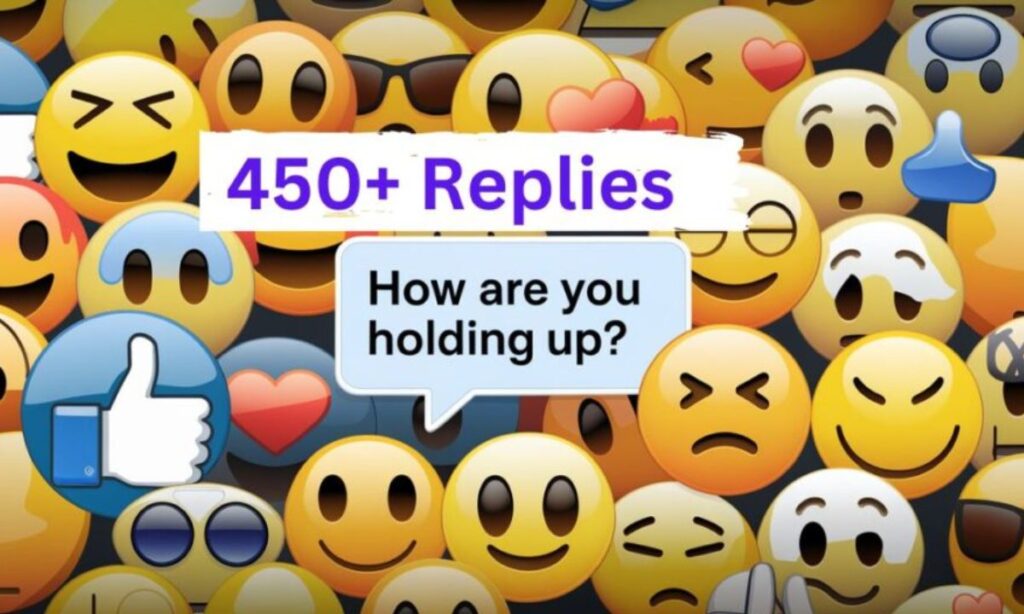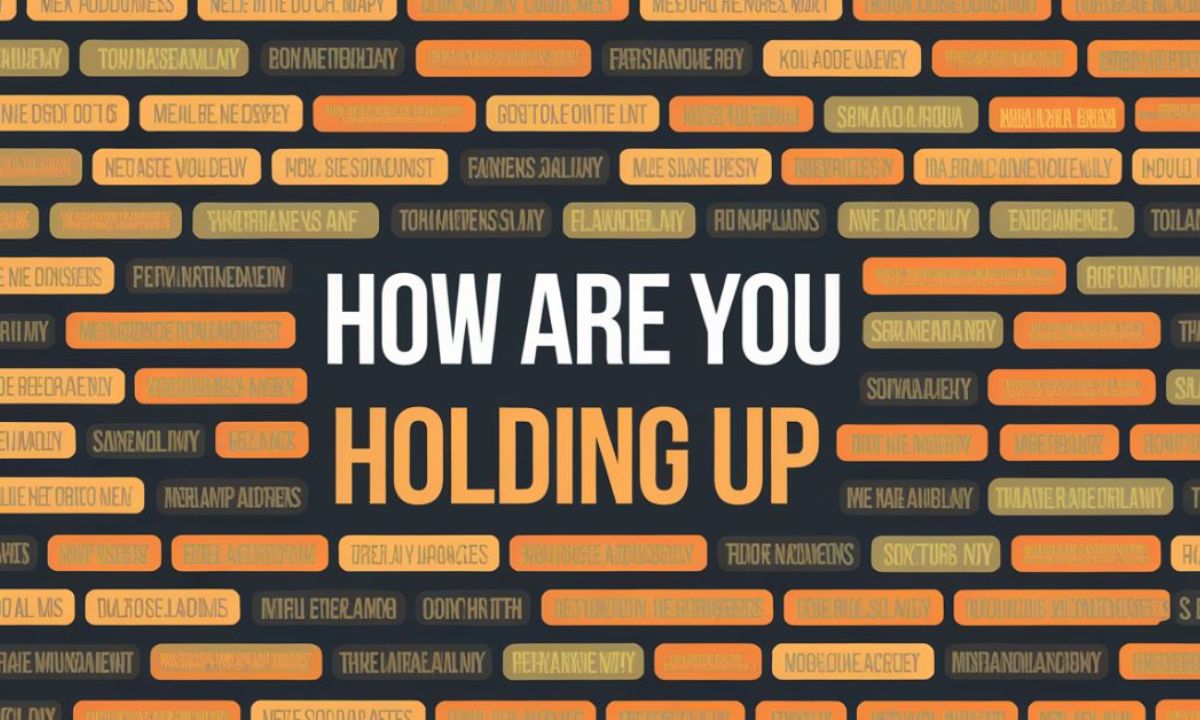Communication is an art of human connection. “How are you holding up?” is a powerful question that goes beyond casual greetings.
It reflects genuine care, empathy, and emotional intelligence. This comprehensive guide explores the depth, nuances, and various ways to respond to this meaningful question.
Understanding the Phrase “How Are You Holding Up?”
The phrase “How are you holding up?” is commonly used to check in on someone’s well-being. It expresses concern for their emotional and mental state, especially during challenging times. This question invites a variety of responses, allowing individuals to share their feelings.
Why People Ask “How Are You Holding Up?”
People often ask this question to show they care. It helps them gauge how someone is coping with stress or adversity. By asking, they offer support and create a sense of connection. This inquiry opens the door for deeper conversations and fosters empathy.
450+ Replies To “How Are You Holding Up?”
Here’s a collection of responses categorized by tone and context. Whether you’re feeling positive, neutral, or need to express struggles, this list offers plenty of options.

Positive Responses
- “I’m doing great, thanks for asking!”
- “I’m feeling optimistic and strong.”
- “Things are looking up, and I’m staying positive.”
- “I’m holding up nicely, thanks for asking.”
- “I’m managing well, and I appreciate your concern.”
Neutral Responses
- “I’m managing, thanks for asking.”
- “I’m hanging in there.”
- “I’m doing okay, just taking things day by day.”
- “I’m coping as best as I can.”
- “I’m holding up alright, thanks.”
Negative Responses
- “Not great, it’s been a rough time.”
- “I’m struggling more than I’d like to admit.”
- “It’s been tough, and I’m feeling overwhelmed.”
- “I’m having a hard time dealing with everything.”
- “Things aren’t going well, to be honest.”
Honest Responses
- “Honestly, it’s been tough, but I’m getting through it.”
- “I’m finding it hard, but I’m working on it.”
- “I’m having a hard time, but I’m hanging in there.”
- “It’s been a struggle lately, but I’m doing what I can.”
- “I’m not okay, but I’m taking things one day at a time.”
Humorous Responses
- “I’m still alive, so that’s a win, right?”
- “Better than a cat in a hammock, but not by much!”
- “I’m holding up like a stack of pancakes—just trying not to fall apart.”
- “Like a duck on a pond—calm on the surface but paddling furiously underneath.”
- “Holding up like a champ—if the champ was running on coffee and good intentions.”
Professional Responses
- “I’m managing effectively, thank you for asking.”
- “I’m navigating the situation with a strategic approach.”
- “I’m balancing my responsibilities and staying focused.”
- “I’m keeping on track and ensuring everything is under control.”
- “I’m addressing the challenges as they arise.”
Supportive Responses
- “I’m here for you; just let me know if you need anything.”
- “You’re handling this well. Remember, you’re not alone.”
- “I’m thinking of you and sending positive thoughts.”
- “Keep going, and don’t hesitate to ask for help if you need it.”
- “You’re showing a lot of strength. Keep taking things one day at a time.”
Cautious Responses
- “I’m managing, but there are some challenges.”
- “I’m getting through it, though it’s been a bit tough.”
- “I’m okay, but I’m keeping a close eye on things.”
- “I’m coping, though I’m mindful of the ongoing challenges.”
- “I’m handling things carefully at the moment.”
Content Responses
- “I’m in a good place right now, all things considered.”
- “I’m feeling quite stable and happy.”
- “I’m managing nicely and things are looking up.”
- “I’m feeling balanced and in control.”
- “I’m doing well and feeling quite satisfied.”
Hopeful Responses
- “I’m staying hopeful and looking forward to better days.”
- “I’m keeping a positive outlook and trusting things will improve.”
- “I’m managing well and believing things will get better.”
- “I’m feeling optimistic about the future.”
- “I’m holding on to hope and taking things one day at a time.”
Appreciative Responses
- “Thank you for checking in. I’m managing quite well.”
- “I appreciate your concern. I’m holding up okay.”
- “Thanks for asking. Your support means a lot.”
- “I’m grateful for your question. I’m doing fine.”
- “Thank you for your kindness. I’m handling things well.”
Encouraging Responses
- “You’re doing great—keep pushing forward!”
- “Hang in there; things will get better.”
- “You’re handling this well. Keep going strong!”
- “You’ve got this! Keep up the effort.”
- “Stay determined; you’re handling things really well.”
Reserved Responses
- “I’m managing, thanks.”
- “I’m doing okay, just keeping to myself.”
- “I’m fine, just taking it day by day.”
- “I’m alright, not much to report.”
- “I’m coping, thanks for asking.”
Acknowledging Responses
- “I appreciate you asking. I’m managing.”
- “Thanks for checking in. I’m doing okay.”
- “I acknowledge your concern. I’m handling things.”
- “Thank you for asking. I’m getting through it.”
- “I recognize your support. I’m doing alright.”
Detailed Responses
- “I’m managing fairly well, though it’s been a bit challenging with the added responsibilities.”
- “I’m doing okay. I’ve been balancing work and personal life carefully.”
- “I’m coping, but it’s been a busy few weeks. I’m prioritizing my tasks.”
- “I’m holding up well overall. I’ve been making a point to exercise regularly.”
- “I’m managing through the current situation. I’m focusing on maintaining a healthy routine.”
Brief Responses
- “I’m doing well, thanks.”
- “I’m fine, just taking it day by day.”
- “I’m okay, managing as usual.”
- “I’m holding up alright.”
- “I’m good, thanks for asking.”
Direct Responses
- “I’m doing well.”
- “I’m okay, thanks.”
- “I’m managing just fine.”
- “I’m handling it well.”
- “I’m doing alright.”
Open Responses
- “I’m managing, but I’m open to talking more about it if you’re interested.”
- “I’m doing okay. Feel free to ask if you want to know more details.”
- “I’m handling things, but I’m happy to share more if you’d like.”
- “I’m alright. Let me know if you want to discuss it further.”
- “I’m holding up, but I’m open to chatting if you have more questions.”
Reflective Responses
- “I’ve been thinking about how much I’ve grown through this. It’s been a journey.”
- “I’m managing, though it’s been a chance to reflect on what really matters.”
- “I’m holding up. It’s been a time of self-discovery and understanding.”
- “I’m coping. It’s been a period of evaluating what’s truly important to me.”
- “I’m doing alright. This experience has given me a lot to think about.”
Resilient Responses
- “I’m facing challenges but learning to adapt.”
- “I’m holding up, finding strength in difficult times.”
- “I’m managing, focusing on resilience and growth.”
- “I’m coping, embracing change and moving forward.”
- “I’m doing well, bolstered by my support network.”
Faithful Responses
- “I’m relying on my faith to get me through.”
- “I’m holding up, trusting the process.”
- “I’m coping by leaning on my beliefs.”
- “I’m managing with hope and faith guiding me.”
- “I’m doing well, finding strength in my spirituality.”
Adventurous Responses
- “I’m holding up, ready to take on new challenges.”
- “I’m managing, seeking adventure in everyday life.”
- “I’m doing great, excited for what’s next!”
- “I’m coping, embracing life’s unpredictability.”
- “I’m holding up, exploring new horizons.”
Grateful Responses
- “I’m thankful for the support I have.”
- “I’m managing well, appreciating the little things.”
- “I’m doing fine, grateful for each day.”
- “I’m holding up, recognizing my blessings.”
- “I’m coping, focusing on gratitude and positivity.”
Creative Responses
- “I’m doing well, like a painter with a fresh canvas.”
- “I’m holding up, crafting my own story.”
- “I’m managing, finding joy in creativity.”
- “I’m coping, expressing myself through art.”
- “I’m doing great, inspired by new ideas.”
Curious Responses
- “I’m holding up, eager to learn more about myself.”
- “I’m managing, exploring new interests.”
- “I’m doing well, curious about what’s next.”
- “I’m coping, asking questions and seeking answers.”
- “I’m holding up, excited for new discoveries.”
Balanced Responses
- “I’m doing well, maintaining balance in my life.”
- “I’m managing, focusing on work-life harmony.”
- “I’m holding up, prioritizing self-care.”
- “I’m coping, striving for equilibrium.”
- “I’m doing great, balancing responsibilities and relaxation.”
Practical Responses
- “I’m managing, taking things one step at a time.”
- “I’m holding up, focusing on actionable steps.”
- “I’m doing well, handling tasks efficiently.”
- “I’m coping, prioritizing what matters most.”
- “I’m doing fine, applying practical solutions.”
Energetic Responses
- “I’m holding up, full of energy and enthusiasm!”
- “I’m doing great, ready to tackle whatever comes my way!”
- “I’m managing, fueled by positivity and vigor.”
- “I’m coping, embracing each day with excitement.”
- “I’m doing well, energized and motivated!”
READ THIS BLOG: How Old Is Vinnie Hacker? Discover His Age & More
Generous Responses
- “I’m holding up, eager to help others.”
- “I’m managing, sharing positivity with those around me.”
- “I’m doing well, focused on kindness and generosity.”
- “I’m coping, finding joy in uplifting others.”
- “I’m doing great, inspired to give back.”
Open-minded Responses
- “I’m holding up, open to new ideas and perspectives.”
- “I’m managing, embracing change and growth.”
- “I’m doing well, ready to learn from experiences.”
- “I’m coping, seeking understanding and insight.”
- “I’m doing fine, staying adaptable and receptive.”
Cultural Variations in Responses
Responses can vary greatly across cultures. What may be considered an appropriate or polite answer in one culture might not be the same in another. Understanding these variations can enhance communication and connection.
Tips for Crafting Your Response
- Be Authentic: Share your true feelings.
- Consider the Relationship: Tailor your response based on who is asking.
- Use Humor Wisely: Lighten the mood if appropriate.
- Stay Positive: Even in tough times, focus on the silver lining.
- Encourage Dialogue: Invite further conversation if you feel comfortable.
Psychological Impact of Responses
Responses to “How are you holding up?” can significantly impact both the asker and the responder. Positive responses can uplift spirits, while honest or negative responses can foster deeper connections and support.
Frequently Asked Questions
What does it mean when someone asks, “How are you holding up?”
It’s a way for someone to check on your well-being, especially during difficult times.
How should I respond if I’m not doing well?
You can be honest or use a neutral response, depending on your comfort level.
Is it okay to use humor in my response?
Yes, humor can lighten the mood, but ensure it’s appropriate for the situation.
How do I know what response to give?
Consider your relationship with the person and how comfortable you feel sharing your feelings.
Can my response affect my mental health?
Yes, positive responses can boost your mood, while sharing struggles may help you feel supported.
Conclusion
Responding to “How are you holding up?” can be an opportunity for connection and understanding. Whether you choose a positive, honest, or humorous reply, the key is to be authentic.
Use this extensive collection of responses to guide your replies, and remember that sharing your feelings can foster deeper relationships and support during tough times.

Hayyat is a talented content writer and digital marketer with expertise in SEO, social media management, and online marketing. She excels at creating impactful, data-driven content to help businesses connect with their target audience and achieve measurable outcomes.














